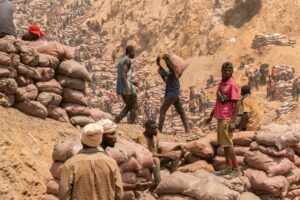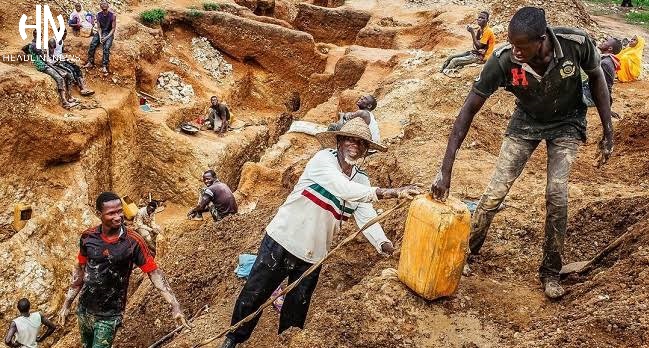The rural community of Bolle in Adamawa State is at the centre of a fast-unfolding crisis as uncontrolled and unsupervised mining activities—largely carried out by Chinese nationals—threaten the environment, public safety, and Nigeria’s economic sovereignty.
The development mirrors disturbing precedents in Kebbi, Zamfara, and Nasarawa States, where illegal mining has been linked to environmental degradation, armed militancy, and billions of naira in lost revenue.

The urgency of the situation was underscored by the devastating flood of July 2025 in Yola and surrounding communities, which left 23 people dead and displaced more than 2,000 residents. Experts and community leaders have attributed the disaster to terrain destabilisation and blocked waterways caused by illegal mining pits in Bolle.
Mining Without Oversight
Investigations reveal that the mining boom in Bolle is taking place in a regulatory vacuum. Most operators, believed to be Chinese nationals working with local collaborators, lack proper licenses, environmental assessments, or tax documentation.
Farmlands and forests are being cleared, while the unregulated use of toxic chemicals such as mercury and cyanide poses serious health risks to nearby communities.
Residents say safety standards are nonexistent. Local workers, including children, are exposed to hazardous conditions. At the same time, reports suggest that some mining camps have become havens for criminal gangs and armed militias—echoing the lawlessness that engulfed Zamfara.

Economic and Governance Failures
Neither the Adamawa State Government nor the Federal Government currently earns revenue from the mining in Bolle. Minerals are allegedly smuggled out of the country disguised as scrap exports.
Observers say the activities are sustained by corruption and institutional negligence. Mining is reportedly carried out under fake cooperative societies and questionable “exploratory licenses,” often facilitated by compromised local and federal officials.
Comparisons with other states paint a grim picture:
- In Zamfara, gold mining was linked to the 2010 lead poisoning epidemic that killed over 400 children.
- In Kebbi, collusion between traditional rulers and Chinese miners led to revenue losses of over ₦3 billion annually.
- In Nasarawa, Chinese operators were found using forged documents and diplomatic protection until a federal clampdown in 2023.

Policy Recommendations
Experts have urged urgent intervention from the Adamawa State Government and the Nigerian Immigration Service (NIS) to curb the crisis.
For the state government, proposals include:
- Establishing a State Mining Oversight Task Force to monitor and enforce mining laws.
- Making licenses and community consent mandatory for all operations.
- Enforcing environmental regulations, including compulsory impact assessments and flood-risk plans.
- Registering mining operators with the state tax authorities to ensure royalties and levies are paid.
- Launching public awareness campaigns and whistleblower protection programmes.
For the NIS, analysts recommend:
- Stricter background checks on foreign miners, particularly Chinese nationals.
- Deportation and blacklisting of those engaged in illegal mining.
- Stronger collaboration with Customs and the DSS to police mining sites and export routes.

The Corruption Question
Beyond the environmental and security risks, the persistence of Chinese-controlled mining across multiple states points to systemic corruption. According to the report, immigration officers, state officials, and political elites are deeply enmeshed in networks that facilitate fake permits, visa racketeering, and smuggling of Nigeria’s mineral wealth.
Policy analysts at Pegasus Consults, Abuja have called for the establishment of a Presidential Mining Transparency Commission to investigate and prosecute those involved—foreign or domestic.

A Test of Political Will
The July 2025 flood has become a grim reminder of what is at stake if Adamawa State fails to act. The loss of lives, displacement of thousands, and destruction of homes point to the deadly consequences of ignoring mining regulations.
“The crisis in Bolle is not isolated,” analysts warn. “It reflects Nigeria’s broader failure to govern its natural resources. If unchecked, the state risks environmental collapse, community unrest, and a squandered opportunity for economic empowerment.”
For Adamawa State, the choice is stark: reclaim its mineral wealth through regulation and transparency, or allow unchecked exploitation to drive further disaster.

Sources:
- Human Rights Watch (2010–2020)
- NEITI Mineral Sector Reports (2021–2023)
- Federal Ministry of Mines and Steel Development Circulars
- Nigerian Immigration Service Statistics (2022)
- Premium Times Investigations (July 2025)
- Daily Trust Flood Displacement Report (July 2025)
- Adamawa State Emergency Management Agency (ASEMA)




